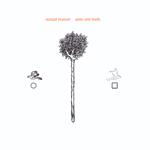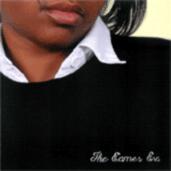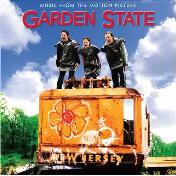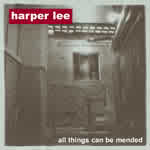6 Music Reviews
by dave heaton
Ape House, Tired of Style (Crof-Tone Records)
 Smart-ass power-pop heroes Ape House sound a bit older and wiser on their new album Tired of Style, though just as gifted at coming up with perfect melodies and turning their guitars up to 11. Actually, the impression of maturity has more to do with the music than the lyrics - these songs sound somehow sadder and fuller in scope. They still rock, but with that extra something that can give straight ahead rock guitars extra emotional resonance. Their basic lyrical content is still about partying, drinking, playing loud-fast rock and pursuing romantic encounters...and they still sing about all those topics with self-deprecation disguised as machoness, a certain amount of hurt lying underneath big talk. The songs are just as catchy and the presentation just as energetic as on their last album, ...Minutes to Go, but here there's a slightly more subdued atmosphere that plays up the melancholy and plays down the humor. Songs like "Wishing Yourself to Sleep" and "Kissing Your Life" - with lyrics like "jobs are all taken/your confidence breaking/you're kissing your life goodbye" - rock out while spelling out the feeling of resignation that lives in the guitars throughout the album, a feeling that (to me) feels all too appropriate these days. That said, it'd be a mistake to play down Ape House's ability to write and play big rock and roll anthems that make rock music feel like the most important thing in the world. Tired of Sleep rocks without hesitation, but isn't all cheap thrills either.
Smart-ass power-pop heroes Ape House sound a bit older and wiser on their new album Tired of Style, though just as gifted at coming up with perfect melodies and turning their guitars up to 11. Actually, the impression of maturity has more to do with the music than the lyrics - these songs sound somehow sadder and fuller in scope. They still rock, but with that extra something that can give straight ahead rock guitars extra emotional resonance. Their basic lyrical content is still about partying, drinking, playing loud-fast rock and pursuing romantic encounters...and they still sing about all those topics with self-deprecation disguised as machoness, a certain amount of hurt lying underneath big talk. The songs are just as catchy and the presentation just as energetic as on their last album, ...Minutes to Go, but here there's a slightly more subdued atmosphere that plays up the melancholy and plays down the humor. Songs like "Wishing Yourself to Sleep" and "Kissing Your Life" - with lyrics like "jobs are all taken/your confidence breaking/you're kissing your life goodbye" - rock out while spelling out the feeling of resignation that lives in the guitars throughout the album, a feeling that (to me) feels all too appropriate these days. That said, it'd be a mistake to play down Ape House's ability to write and play big rock and roll anthems that make rock music feel like the most important thing in the world. Tired of Sleep rocks without hesitation, but isn't all cheap thrills either.
Richard Buckner, Dents and Shells (Merge Records)
 "As a child, once, I almost marked it all. It isn't gone, still, chasing sometimes, and running all night." Richard Buckner's lyrics read like a shorthand cataloguing of the hopes, desires, memories and fears of people who are trying to work their lives out. The people in the songs on Dents and Shells are searching for something, generally a place to rest and get their lives straight. Richard Buckner's sonorous baritone gives voice to their stories and feelings, over sometimes delicate, sometimes forceful, but always perfectly melodic country-ish pop tunes. Dents and Shells is on one level a typical Richard Buckner album. He's one of those musicians where consistency is often mistaken for sameness - and on this one he's working very much within the sound you'd expect from him. Yet for some reason I find Dents and Shells to be one of the most emotionally stirring albums he's done, perhaps his most moving one since 1997's Devotion + Doubt. I think it has to do with the presentation of the songs, how the musical accompaniment (including piano, guitars) is complementary in a way that heightens the melodic and melancholic impact while giving his voice a starkness that makes it especially powerful. His voice rings through you, his words and melodies haunt.
"As a child, once, I almost marked it all. It isn't gone, still, chasing sometimes, and running all night." Richard Buckner's lyrics read like a shorthand cataloguing of the hopes, desires, memories and fears of people who are trying to work their lives out. The people in the songs on Dents and Shells are searching for something, generally a place to rest and get their lives straight. Richard Buckner's sonorous baritone gives voice to their stories and feelings, over sometimes delicate, sometimes forceful, but always perfectly melodic country-ish pop tunes. Dents and Shells is on one level a typical Richard Buckner album. He's one of those musicians where consistency is often mistaken for sameness - and on this one he's working very much within the sound you'd expect from him. Yet for some reason I find Dents and Shells to be one of the most emotionally stirring albums he's done, perhaps his most moving one since 1997's Devotion + Doubt. I think it has to do with the presentation of the songs, how the musical accompaniment (including piano, guitars) is complementary in a way that heightens the melodic and melancholic impact while giving his voice a starkness that makes it especially powerful. His voice rings through you, his words and melodies haunt.
David Dondero, Live at the Hemlock (Future Farmer)
 David Dondero's Live at the Hemlock depicts the traveling folk singer at home, for a night. His casual, joking banter with the audience (much of it centered on teasing his drummer, Craig D) reveals a temporary comfort with where he's playing, as he sings song after song about the people he's met and conclusions he's come to while traveling the country and singing his songs. Starting with the first two songs from his most recent studio album The Transient and then journeying through parts of his previous three albums, Dondero and his drummer roll through his songs in appropriately ramshackle fashion, highlighting their open-heartedness as well as the great melodies. There's an incisive new anti-war song called "Pre-Invasion Jitters" - thankfully, a protest song that doesn't pull any punches - as well as great versions of favorites like "Motion Picture Song," "Song for the Civil Engineer," "Michael Ranes" and "If You Break My Heart." Dondero's songs have an honesty and personal-ness to them that's effective at capturing truths about people and places; that's no less true here than on his studio albums, making Live at the Hemlock worthwhile for fans and newcomers alike.
David Dondero's Live at the Hemlock depicts the traveling folk singer at home, for a night. His casual, joking banter with the audience (much of it centered on teasing his drummer, Craig D) reveals a temporary comfort with where he's playing, as he sings song after song about the people he's met and conclusions he's come to while traveling the country and singing his songs. Starting with the first two songs from his most recent studio album The Transient and then journeying through parts of his previous three albums, Dondero and his drummer roll through his songs in appropriately ramshackle fashion, highlighting their open-heartedness as well as the great melodies. There's an incisive new anti-war song called "Pre-Invasion Jitters" - thankfully, a protest song that doesn't pull any punches - as well as great versions of favorites like "Motion Picture Song," "Song for the Civil Engineer," "Michael Ranes" and "If You Break My Heart." Dondero's songs have an honesty and personal-ness to them that's effective at capturing truths about people and places; that's no less true here than on his studio albums, making Live at the Hemlock worthwhile for fans and newcomers alike.
The Eames Era, The Second EP (C Student Records)
 Looking for an EP by a new-ish pop-rock band that'll get you excited and then leave you wanting to here more? How about four songs that are spunky but also filled with real emotion? And great melodies, do you want some of those, too? All this and more is what you'll get from The Second EP by The Eames Era. I sound like a third-rate hypeman I know, but this is the sort of little EP that makes me wish I could hand out free copies on the streetcorner next to the people doling out Bibles. The EP kicks off with the somewhat Rilo Kiley-ish "Could Be Anything"; it's a great lost college rock hit from the 90s if I ever heard one, with choppy guitars and nice harmony vocals, but sounds fresh as anything. "All of Seventeen," "You May Not Know My Name, and "I Said" keep the same feeling going, with lots of energy and lyrics that are funny and sweet. But more than words it's the Eames Era's overall sound that I find irresistible, the way lead singer Ashlin Phillips' voice fits so casually over the guitar-led energy, and their melodies, which are fantastic. They've hooked me with 13 minutes; I look forward to hearing what they do with 40 or so.
Looking for an EP by a new-ish pop-rock band that'll get you excited and then leave you wanting to here more? How about four songs that are spunky but also filled with real emotion? And great melodies, do you want some of those, too? All this and more is what you'll get from The Second EP by The Eames Era. I sound like a third-rate hypeman I know, but this is the sort of little EP that makes me wish I could hand out free copies on the streetcorner next to the people doling out Bibles. The EP kicks off with the somewhat Rilo Kiley-ish "Could Be Anything"; it's a great lost college rock hit from the 90s if I ever heard one, with choppy guitars and nice harmony vocals, but sounds fresh as anything. "All of Seventeen," "You May Not Know My Name, and "I Said" keep the same feeling going, with lots of energy and lyrics that are funny and sweet. But more than words it's the Eames Era's overall sound that I find irresistible, the way lead singer Ashlin Phillips' voice fits so casually over the guitar-led energy, and their melodies, which are fantastic. They've hooked me with 13 minutes; I look forward to hearing what they do with 40 or so.
Garden State Soundtrack (Sony)
 There's one reason I wanted to write about the soundtrack to the movie Garden State: Iron and Wine's transcendent cover of the Postal Service's neo-new wave alterna hit "Such Great Heights." His contemplative folk cover strips the song down to its essence, capturing its romance, sadness and longing perhaps even more perfectly than the original did. They stand at almost exact opposite ends in terms of mood - the original being a great slice of modern-day life in perpetual motion, the original finding a calm place within the storm - yet both hit on the same feelings. The rest of the Garden State soundtrack includes a pair of terrific Shins songs from Oh Inverted World, a couple old standbys (Nick Drake's "One Of These Things First," Paul Simon's "The Only Living Boy in New York") and a handful of dull-to-decent would-be alternative radio hits that go for the same atmosphere. But that Iron and Wine song is the only real reason to care about this album...it's a beauty.
There's one reason I wanted to write about the soundtrack to the movie Garden State: Iron and Wine's transcendent cover of the Postal Service's neo-new wave alterna hit "Such Great Heights." His contemplative folk cover strips the song down to its essence, capturing its romance, sadness and longing perhaps even more perfectly than the original did. They stand at almost exact opposite ends in terms of mood - the original being a great slice of modern-day life in perpetual motion, the original finding a calm place within the storm - yet both hit on the same feelings. The rest of the Garden State soundtrack includes a pair of terrific Shins songs from Oh Inverted World, a couple old standbys (Nick Drake's "One Of These Things First," Paul Simon's "The Only Living Boy in New York") and a handful of dull-to-decent would-be alternative radio hits that go for the same atmosphere. But that Iron and Wine song is the only real reason to care about this album...it's a beauty.
Harper Lee, All Things Can Be Mended (Matinee)
 Think melancholy and sadness have been captured by too many musicians for anyone else to bother? Think again, or at least listen to Harper Lee's new album All Things Can Be Mended if you need convincing. It's as exquisite as melancholy pop albums can be, from the opener "Everybody Leaves" through to the closer, a fatalistic tune with a title that rewrites the Smiths classic title as "There is a light in me that's gone." Lead singer Keris Howard spends the album longing for connection and hoping life will get beter. "Please stay around" is the punch line to "Everybody leaves" on the opening track, and it's the sentiment running beneath the album as a whole. Song after song crystallizes sadness through perfect melodies and harmonies, beautifully constructed arrangements and textures, and succinct lyrics filled with pain (one of the best examples is the devastating song "This is the sound that a heart makes when it's breaking"). Harper Lee's last album Everything's Going to Be OK captured similar feelings, but All Things Can Be Mended (notice the album titles, hopeful against the odds) does so with even more vitality and grace. It's a truly beautiful album, lovely and sad.
Think melancholy and sadness have been captured by too many musicians for anyone else to bother? Think again, or at least listen to Harper Lee's new album All Things Can Be Mended if you need convincing. It's as exquisite as melancholy pop albums can be, from the opener "Everybody Leaves" through to the closer, a fatalistic tune with a title that rewrites the Smiths classic title as "There is a light in me that's gone." Lead singer Keris Howard spends the album longing for connection and hoping life will get beter. "Please stay around" is the punch line to "Everybody leaves" on the opening track, and it's the sentiment running beneath the album as a whole. Song after song crystallizes sadness through perfect melodies and harmonies, beautifully constructed arrangements and textures, and succinct lyrics filled with pain (one of the best examples is the devastating song "This is the sound that a heart makes when it's breaking"). Harper Lee's last album Everything's Going to Be OK captured similar feelings, but All Things Can Be Mended (notice the album titles, hopeful against the odds) does so with even more vitality and grace. It's a truly beautiful album, lovely and sad.
Copyright (c) 2005 erasing clouds |
|